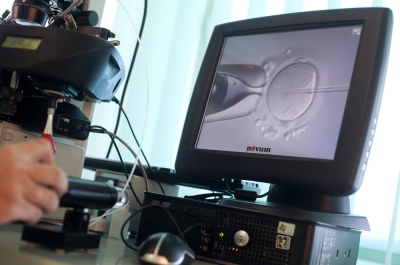To Evangelicals: IVF bioethical questions to grapple with

The Alabama Supreme Court’s February ruling on “extrauterine children — that is, unborn children who are located outside of a biological uterus” has brought a new level of awareness to and conversation about in vitro fertilization (IVF). What has interested me as a Christian and bioethicist is that while Evangelicals have relative unanimity on pro-life issues surrounding abortion, our views on IVF and the creation of embryos outside the womb are much more diverse.
Politico reports that 83% of Evangelicals support IVF, and several self-identified Christian (and perhaps Evangelical) politicians have attempted to hold tightly to both their pro-life stances and the use of IVF. Indeed, we Evangelicals are well-known for our pro-life convictions, so it has been a surprise to many that we are not on the same page when it comes to IVF and the embryos that are created as a part of that process. Ultimately, the truth is before the ruling in Alabama, “the bioethics of I.V.F. is not a subject most conservative Christians have on their radar.”
While IVF is less than 50 years old, infertility, of course, is not a new issue. The Bible records seven accounts of infertility, and Proverbs compares the ache for a child with the “land, which is never satisfied with water, and fire, which never says, ‘Enough!’” But the ways we respond to infertility certainly are new. With these new technologies come new questions about what can be done and what should be done, questions my wife and I have faced firsthand.
We received an infertility diagnosis in our seventh year of marriage, and after initial tests, interventions, and treatments did not lead to a pregnancy, we were offered IVF. In thinking and praying about whether this was something we should pursue, we concluded that “the process of generating new life” should only come about through the intimacy of a husband and wife. As Andrew Walker points out, IVF “disrupts the bodily connection that Scripture depicts as the exclusive context for conceiving children.” Our decision was that human life should not be created in a lab; IVF wasn’t for us.
As I left a career in IT and began the formal study of bioethics, I found that Evangelical opinions on IVF were divided. There is general agreement that embryos should not be intentionally destroyed, and most hold that embryos should not be frozen indefinitely. Many, however, believe that IVF can be ethical for married couples so long as they transfer all the embryos that are created from their eggs and sperm.
Some also point to the fact that embryos are lost in the ordinary course of human procreation and question whether this might mitigate the fact that “Embryo Loss Is Integral to IVF” and “Discarding Embryos Is Inherent to the IVF Process.” Indeed, the gap between the number of embryos created in IVF and the number of children born is staggering.
The United Kingdom’s Human Fertilisation and Embryology Authority (HFEA) reported in 2012 that “93% of all embryos created ... are never used to generate a pregnancy.” There is no reason to believe that the statistics are any better in the United States or that they have improved in the last 12 years.
It’s worth asking, though, whether there’s a difference between what happens in the normal course of events in a fallen world and what happens in the work of a technician in a lab. I would contend that there is a moral difference between the possibility of natural embryo loss and the intentional use of a technique that will result in embryo loss. Two studies in 2021 showed that IVF embryos that are usually discarded as “abnormal” can, in fact, grow into healthy children, calling into question whether the embryos discarded by IVF technicians are analogous to natural embryo loss.
Still, other issues arise in the context of IVF. I am one of many who are concerned that it frequently moves too quickly past other or underlying problems that might be causing infertility. Perhaps some less invasive or less expensive procedure might address such a diagnosis. As but one example, a 2017 study published in the New England Journal of Medicine found that what is colloquially known as “flushing” fallopian tubes led to a significant (28.1% to 38.8%) increase in pregnancies and live births among the studied groups. A great deal of research and assistance is available to those who are willing to explore alternatives to IVF.
IVF is prohibitively expensive for many people dealing with infertility. One round of IVF costs anywhere from $15,000 to $30,000, and because low success rates are inherent in the technique, many couples go through multiple rounds of IVF. This expense is a strong incentive for couples to try to get the most out of one round of IVF, so many people opt to create “excess” embryos that are kept in cold storage in suspended animation. This raises questions regarding wisdom and the stewardship of our finances. Is it virtuous to spend this amount of money in this way for a technique with success rates that are, at their very best, about 50% and decline rapidly with age?
The risks associated with IVF are inherently imbalanced toward women. Ovarian stimulation and egg retrieval procedures have been explored in depth in work done on the issue of egg donation.
Issues also arise in the common practice of embryo grading, which attempts to predict which embryos have the best chance of implanting and being carried to term. Further, preimplantation genetic diagnosis (PGD) to select the sex of a child is offered at nearly three-quarters of IVF clinics. Sex selection and other uses of PGD to screen for the best or, bluntly, the wanted embryos fail to view children as gifts to be received exactly as they are. If we believe that human embryos are deserving of respect and care as human beings, and we pro-life Evangelicals certainly do, then grading and PGD practices are directly at odds with Christian imperatives of fairness, equality, and justice.
Ultimately, though, I maintain my earliest intuitive conviction: it matters how new human life comes into existence, not in regard to the moral value of the person produced from the circumstances, for all human beings are of equal moral worth. But it does matter what we, as a society and specifically those of us who are Christians, condone. This is an aspect of our embodiment, an area of thought arguably underdeveloped in Evangelicalism, although efforts have been made to address that. When I consider our embodiment, I mean not only the one-flesh nature of the marriage relationship but also the fact that we all began as embryos. That is the first stage of embodiment.
You and I were never a sperm or an egg, but we were all embryos. We can draw a straight line of development from that embryo to who we are now. At each stage, from embryo to birth to childhood to adulthood, we require the proper environment and adequate nutrition to flourish. And yet, when it comes to IVF, “93% of all embryos created ... are never used to generate a pregnancy.”
I realize that not all of my pro-life Evangelical kin will agree with me on this. But I want, at the very least, to ask them to think more deeply about the larger issues with IVF and, even more, the larger picture of what it means to be embodied creatures.
Matthew Eppinette, MBA, PhD, is Executive Director of The Center for Bioethics & Human Dignity (CBHD) and Affiliate Professor of Bioethics at Trinity Evangelical Divinity School. Dr. Eppinette has more than two decades of experience in the field of bioethics. He and his wife live in suburban Chicago.





















